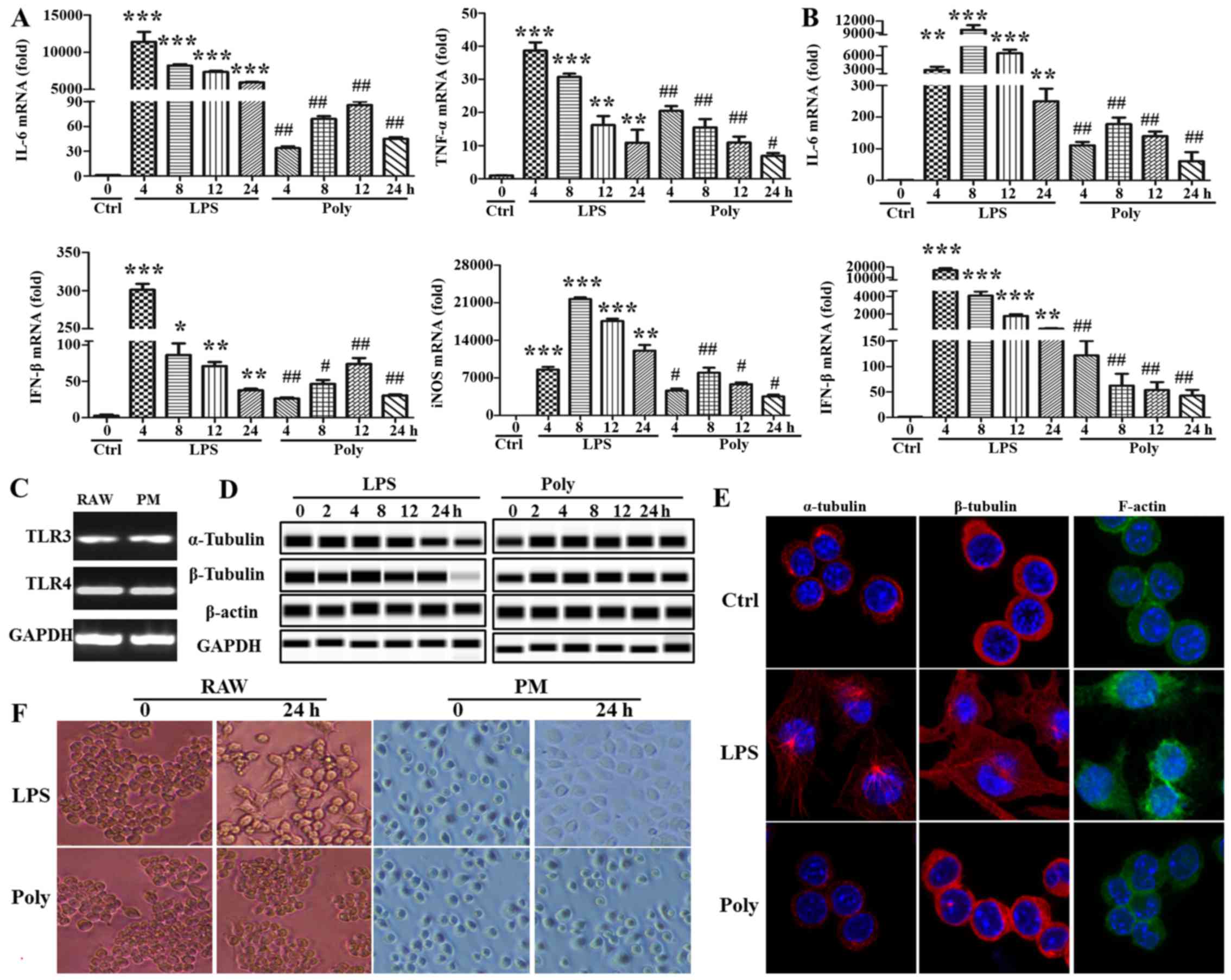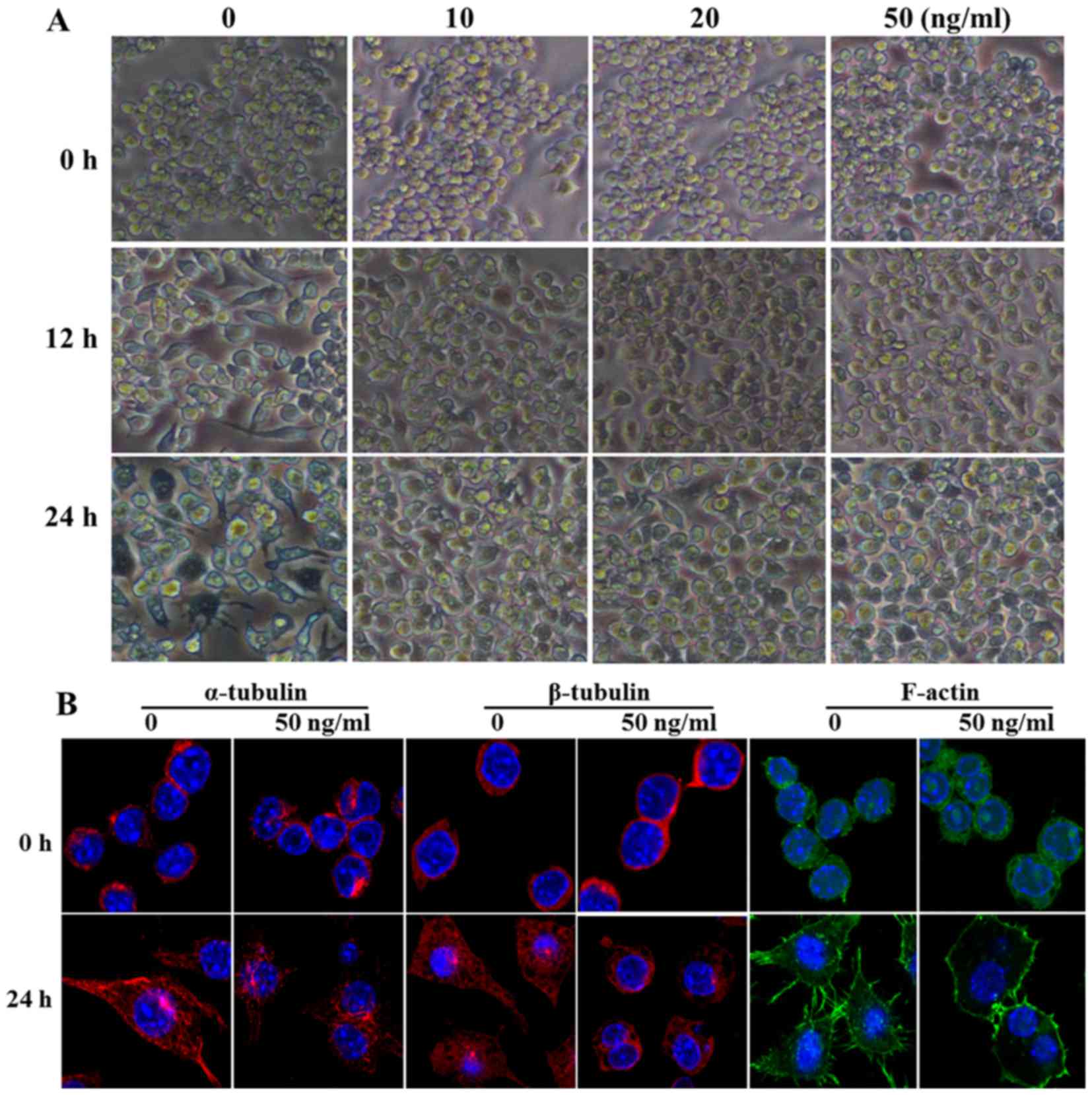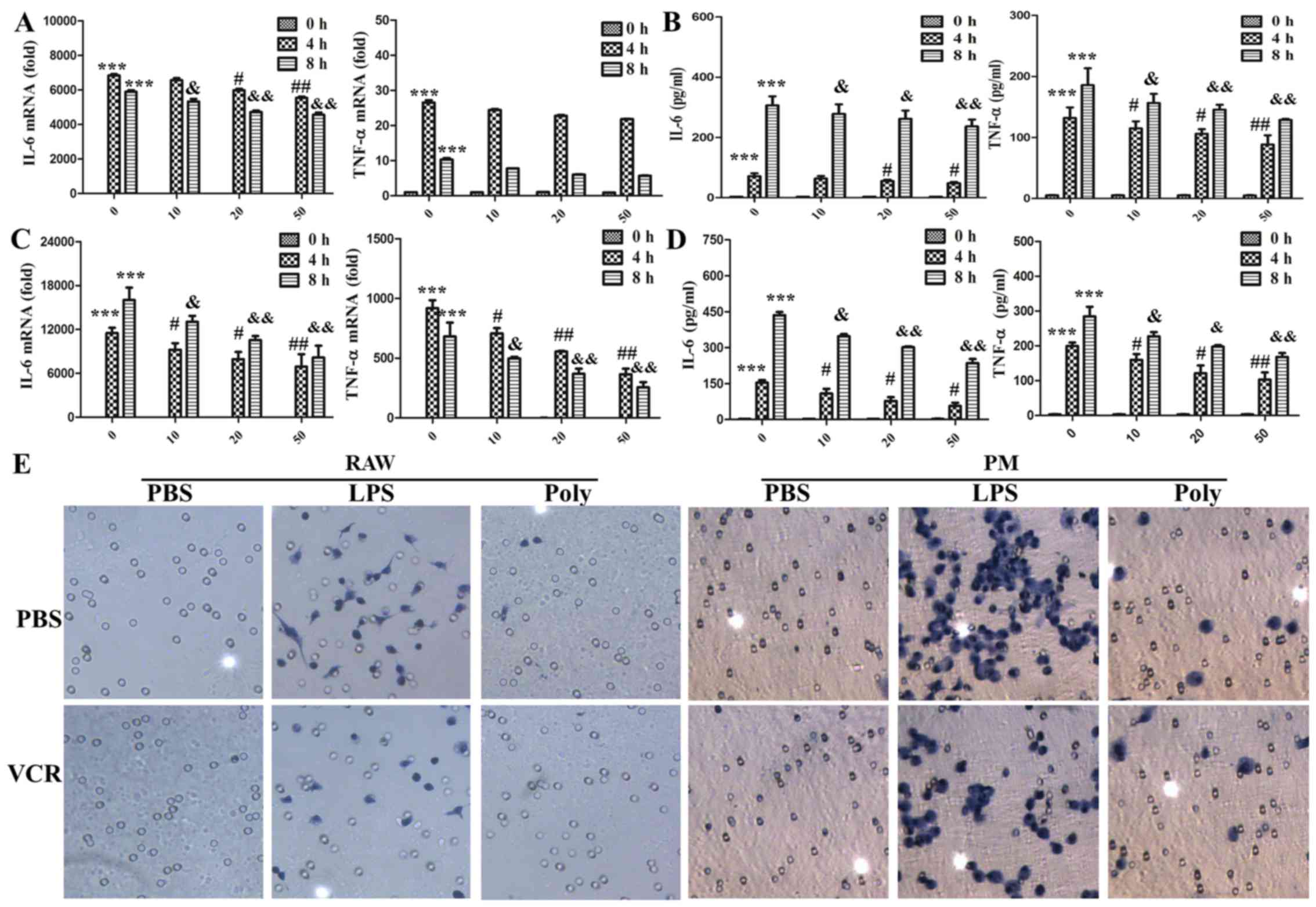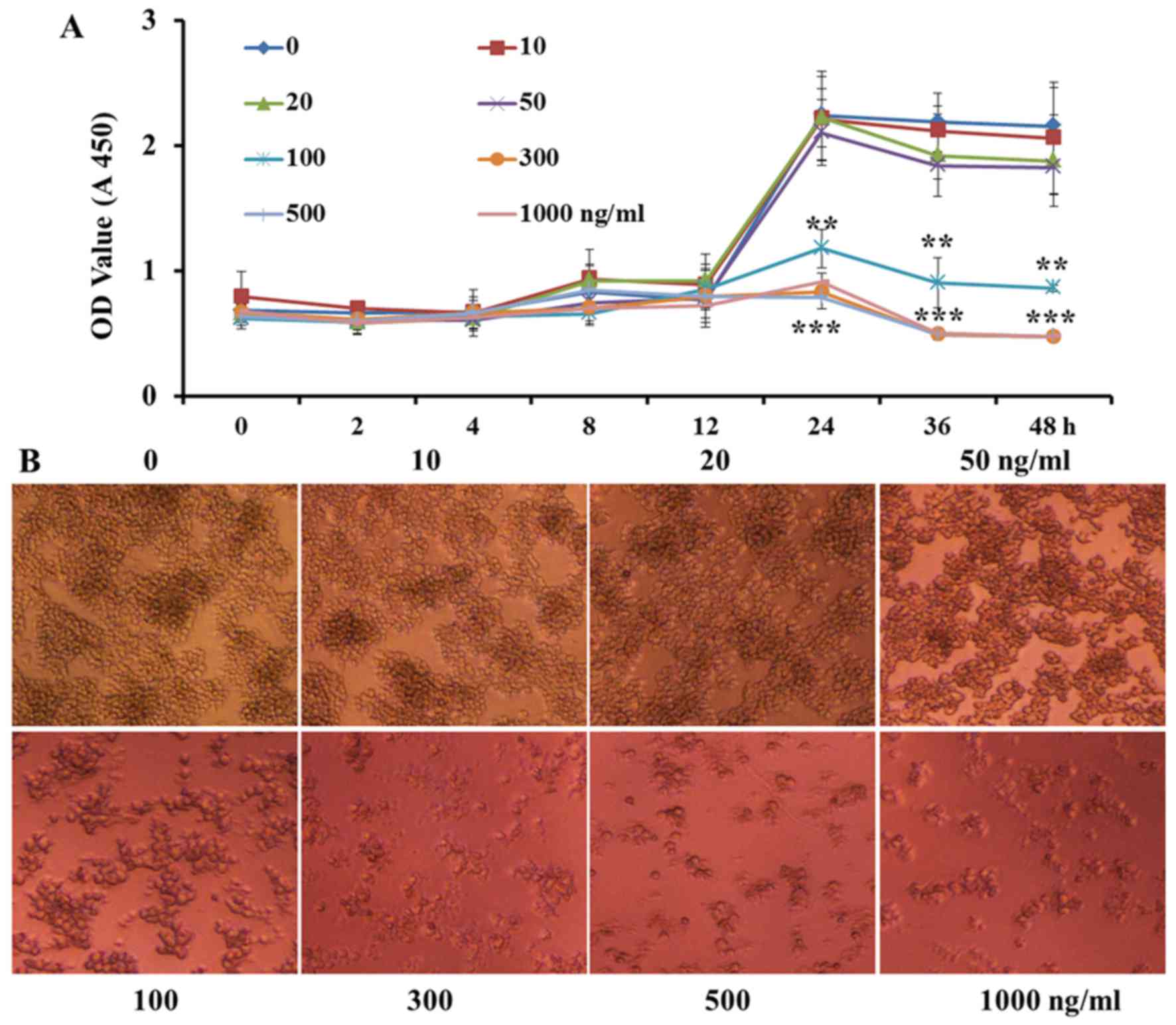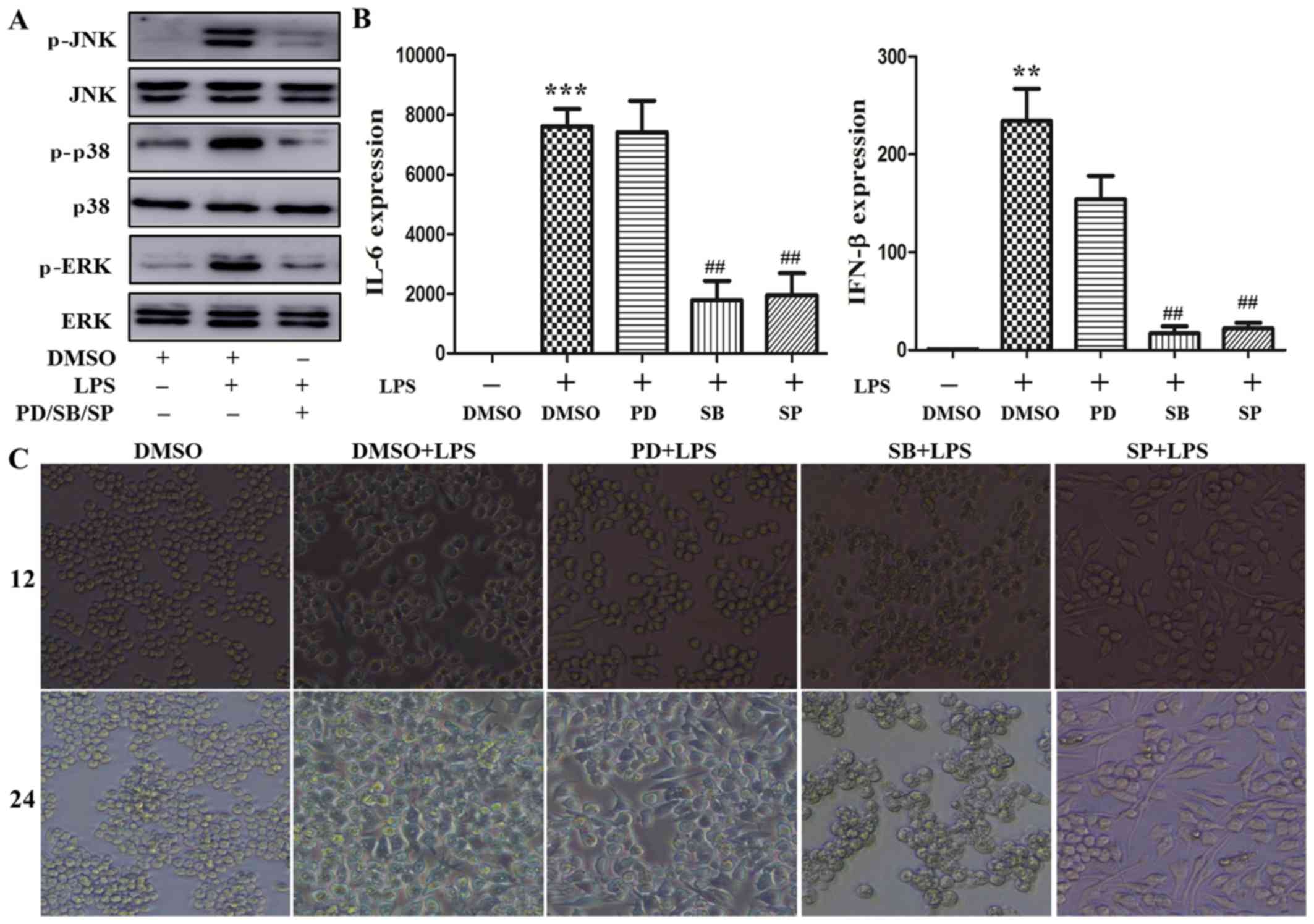|
1
|
Pelka K, Shibata T, Miyake K and Latz E:
Nucleic acid-sensing TLRs and autoimmunity: Novel insights from
structural and cell biology. Immunol Rev. 269:60–75. 2016.
View Article : Google Scholar
|
|
2
|
Kawai T and Akira S: The role of
pattern-recognition receptors in innate immunity: Update on
Toll-like receptors. Nat Immunol. 11:373–384. 2010. View Article : Google Scholar : PubMed/NCBI
|
|
3
|
Zhao W, Qi J, Wang L, Zhang M, Wang P and
Gao C: LY294002 inhibits TLR3/4-mediated IFN-β production via
inhibition of IRF3 activation with a PI3K-independent mechanism.
FEBS Lett. 586:705–710. 2012. View Article : Google Scholar : PubMed/NCBI
|
|
4
|
Bosshart H and Heinzelmann M: Targeting
bacterial endotoxin: Two sides of a coin. Ann NY Acad Sci.
1096:1–17. 2007. View Article : Google Scholar : PubMed/NCBI
|
|
5
|
Kustermans G, Piette J and Legrand-Poels
S: Actin-targeting natural compounds as tools to study the role of
actin cytoskeleton in signal transduction. Biochem Pharmacol.
76:1310–1322. 2008. View Article : Google Scholar : PubMed/NCBI
|
|
6
|
Diesel B, Hoppstädter J, Hachenthal N,
Zarbock R, Cavelius C, Wahl B, Thewes N, Jacobs K, Kraegeloh A and
Kiemer AK: Activation of Rac1 GTPase by nanoparticulate structures
in human macrophages. Eur J Pharm Biopharm. 84:315–324. 2013.
View Article : Google Scholar : PubMed/NCBI
|
|
7
|
Song W, Liu C and Upadhyaya A: The pivotal
position of the actin cytoskeleton in the initiation and regulation
of B cell receptor activation. Biochim Biophys Acta. 1838:569–578.
2014. View Article : Google Scholar
|
|
8
|
Chen YR, Feng F, Wang L, Qu SY, Zhang ZQ,
Liu L, Qin HY, Liang YM and Han H: Deletion of RBP-j in dendritic
cells compromises TLR-mediated DC activation accompanied by
abnormal cytoskeleton reorganization. Mol Biol Rep. 40:1531–1539.
2013. View Article : Google Scholar
|
|
9
|
Moudi M, Go R, Yien CY and Nazre M: Vinca
alkaloids. Int J Prev Med. 4:1231–1235. 2013.
|
|
10
|
Pathak P, Hess R and Weiss MA: Liposomal
vincristine for relapsed or refractory Ph-negative acute
lymphoblastic leukemia: A review of literature. Ther Adv Hematol.
5:18–24. 2014. View Article : Google Scholar : PubMed/NCBI
|
|
11
|
Thakur V, Kush P, Pandey RS, Jain UK,
Chandra R and Madan J: Vincristine sulfate loaded dextran
microspheres amalgamated with thermosensitive gel offered sustained
release and enhanced cytotoxicity in THP-1, human leukemia cells:
In vitro and in vivo study. Mater Sci Eng C. 61:113–122. 2016.
View Article : Google Scholar
|
|
12
|
Ruiz-Gómez MJ, Souviron A,
Martínez-Morillo M and Gil L: P-glycoprotein, glutathione and
glutathione S-transferase increase in a colon carcinoma cell line
by colchicine. J Physiol Biochem. 56:307–312. 2000. View Article : Google Scholar
|
|
13
|
Qi J, Qiao Y, Wang P, Li S, Zhao W and Gao
C: microRNA-210 negatively regulates LPS-induced production of
proinflammatory cytokines by targeting NF-κB1 in murine
macrophages. FEBS Lett. 586:1201–1207. 2012. View Article : Google Scholar : PubMed/NCBI
|
|
14
|
Qi J, Li T, Bian H, Li F, Ju Y, Gao S, Su
J, Ren W and Qin C: SNAI1 promotes the development of HCC through
the enhancement of proliferation and inhibition of apoptosis. FEBS
Open Bio. 6:326–337. 2016. View Article : Google Scholar : PubMed/NCBI
|
|
15
|
Wu J, Zhang H, Hu B, Yang L, Wang P, Wang
F and Meng X: Coptisine from Coptis chinensis inhibits production
of inflammatory mediators in lipopolysaccharide-stimulated RAW264.7
murine macrophage cells. Eur J Pharmacol. 780:106–114. 2016.
View Article : Google Scholar : PubMed/NCBI
|
|
16
|
Bode KA, Schmitz F, Vargas L, Heeg K and
Dalpke AH: Kinetic of RelA activation controls magnitude of
TLR-mediated IL-12p40 induction. J Immunol. 182:2176–2184. 2009.
View Article : Google Scholar : PubMed/NCBI
|
|
17
|
Devisscher L, Verhelst X, Colle I, Van
Vlierberghe H and Geerts A: The role of macrophages in
obesity-driven chronic liver disease. J Leukoc Biol. 99:693–698.
2016. View Article : Google Scholar : PubMed/NCBI
|
|
18
|
Wynn TA and Vannella KM: Macrophages in
tissue repair, regeneration, and fibrosis. Immunity. 44:450–462.
2016. View Article : Google Scholar : PubMed/NCBI
|
|
19
|
Beutler B: Microbe sensing, positive
feedback loops, and the pathogenesis of inflammatory diseases.
Immunol Rev. 227:248–263. 2009. View Article : Google Scholar : PubMed/NCBI
|
|
20
|
Alexopoulou L, Holt AC, Medzhitov R and
Flavell RA: Recognition of double-stranded RNA and activation of
NF-kappaB by Toll-like receptor 3. Nature. 413:732–738. 2001.
View Article : Google Scholar : PubMed/NCBI
|
|
21
|
Ruiz J, Kanagavelu S, Flores C, Romero L,
Riveron R, Shih DQ and Fukata M: Systemic activation of
TLR3-dependent TRIF signaling confers host defense against
gram-negative bacteria in the intestine. Front Cell Infect
Microbiol. 5:1052016. View Article : Google Scholar : PubMed/NCBI
|
|
22
|
Poltorak A, Smirnova I, Clisch R and
Beutler B: Limits of a deletion spanning Tlr4 in C57BL/10ScCr mice.
J Endotoxin Res. 6:51–56. 2000. View Article : Google Scholar : PubMed/NCBI
|
|
23
|
Kagan JC and Medzhitov R:
Phosphoinositide-mediated adaptor recruitment controls Toll-like
receptor signaling. Cell. 125:943–955. 2006. View Article : Google Scholar : PubMed/NCBI
|
|
24
|
Romieu-Mourez R, François M, Boivin MN,
Bouchentouf M, Spaner DE and Galipeau J: Cytokine modulation of TLR
expression and activation in mesenchymal stromal cells leads to a
proinflammatory phenotype. J Immunol. 182:7963–7973. 2009.
View Article : Google Scholar : PubMed/NCBI
|
|
25
|
Xiong Y and Medvedev AE: Induction of
endotoxin tolerance in vivo inhibits activation of IRAK4 and
increases negative regulators IRAK-M, SHIP-1, and A20. J Leukoc
Biol. 90:1141–1148. 2011. View Article : Google Scholar : PubMed/NCBI
|
|
26
|
Xiong Y, Qiu F, Piao W, Song C, Wahl LM
and Medvedev AE: Endotoxin tolerance impairs IL-1
receptor-associated kinase (IRAK) 4 and TGF-beta-activated kinase 1
activation, K63-linked polyubiquitination and assembly of IRAK1,
TNF receptor-associated factor 6, and IkappaB kinase gamma and
increases A20 expression. J Biol Chem. 286:7905–7916. 2011.
View Article : Google Scholar : PubMed/NCBI
|
|
27
|
Murphy MB, Xiong Y, Pattabiraman G,
Manavalan TT, Qiu F and Medvedev AE: Pellino-3 promotes endotoxin
tolerance and acts as a negative regulator of TLR2 and TLR4
signaling. J Leukoc Biol. 98:963–974. 2015. View Article : Google Scholar : PubMed/NCBI
|
|
28
|
Foster SL, Hargreaves DC and Medzhitov R:
Gene-specific control of inflammation by TLR-induced chromatin
modifications. Nature. 447:972–978. 2007.PubMed/NCBI
|
|
29
|
O'Neill LA, Sheedy FJ and McCoy CE:
MicroRNAs: The fine-tuners of Toll-like receptor signalling. Nat
Rev Immunol. 11:163–175. 2011. View
Article : Google Scholar : PubMed/NCBI
|
|
30
|
Zhao W, Wang L, Zhang M, Wang P, Qi J,
Zhang L and Gao C: Nuclear to cytoplasmic translocation of
heterogeneous nuclear ribonucleoprotein U enhances TLR-induced
proinflammatory cytokine production by stabilizing mRNAs in
macrophages. J Immunol. 188:3179–3187. 2012. View Article : Google Scholar : PubMed/NCBI
|
|
31
|
Zhang M, Wang L, Zhao X, Zhao K, Meng H,
Zhao W and Gao C: TRAF-interacting protein (TRIP) negatively
regulates IFN-β production and antiviral response by promoting
proteasomal degradation of TANK-binding kinase 1. J Exp Med.
209:1703–1711. 2012. View Article : Google Scholar : PubMed/NCBI
|
|
32
|
Chan ED and Riches DW: IFN-gamma + LPS
induction of iNOS is modulated by ERK, JNK/SAPK, and p38(mapk) in a
mouse macrophage cell line. Am J Physiol Cell Physiol.
280:C441–C450. 2001.PubMed/NCBI
|
|
33
|
Kaminska B: MAPK signalling pathways as
molecular targets for anti-inflammatory therapy–from molecular
mechanisms to therapeutic benefits. Biochim Biophys Acta.
1754:253–262. 2005. View Article : Google Scholar : PubMed/NCBI
|
|
34
|
Lee GL, Wu JY, Tsai CS, Lin CY, Tsai YT,
Lin CS, Wang YF, Yet SF, Hsu YJ and Kuo CC: TLR4-activated
MAPK-IL-6 axis regulates vascular smooth muscle cell function. Int
J Mol Sci. 17:E13942016. View Article : Google Scholar : PubMed/NCBI
|
|
35
|
Hu M, Fan M, Zhen J, Lin J, Wang Q, Lv Z
and Wang R: FAK contributes to proteinuria in hypercholesterolaemic
rats and modulates podocyte F-actin re-organization via activating
p38 in response to ox-LDL. J Cell Mol Med. 21:552–567. 2017.
View Article : Google Scholar
|
|
36
|
Toledo FD, Basiglio CL, Barosso IR,
Boaglio AC, Zucchetti AE, Sánchez Pozzi EJ and Roma MG:
Mitogen-activated protein kinases are involved in hepatocanalicular
dysfunction and cholestasis induced by oxidative stress. Arch
Toxicol. 91:2391–2403. 2017. View Article : Google Scholar
|















